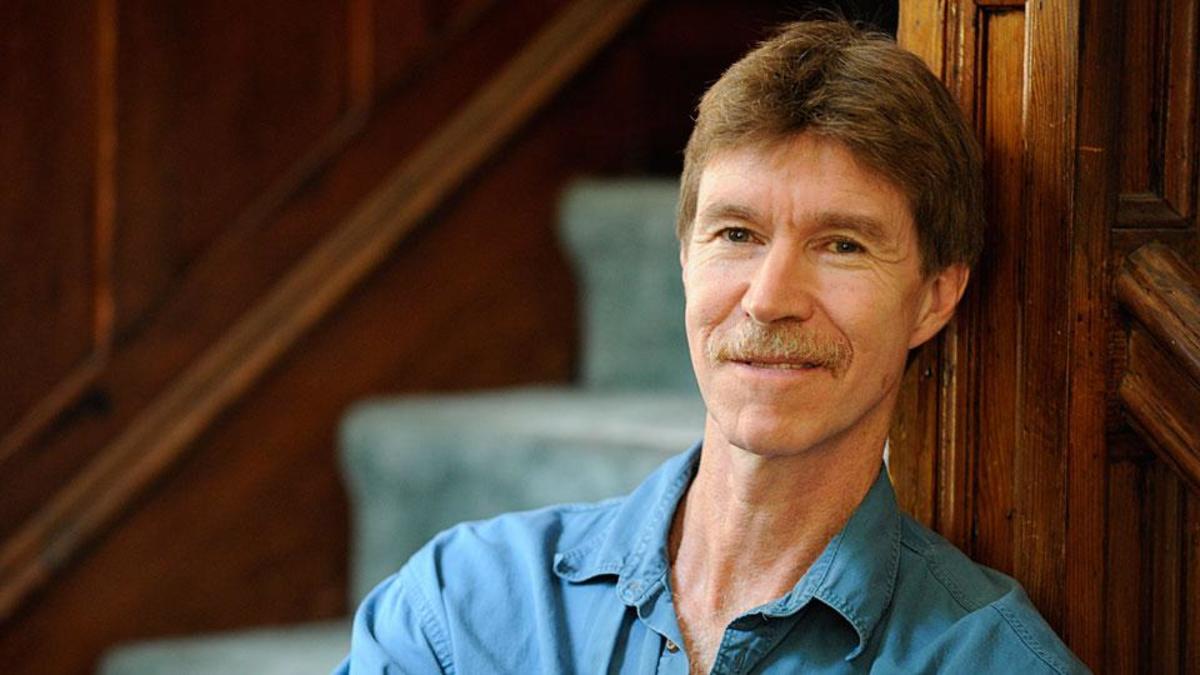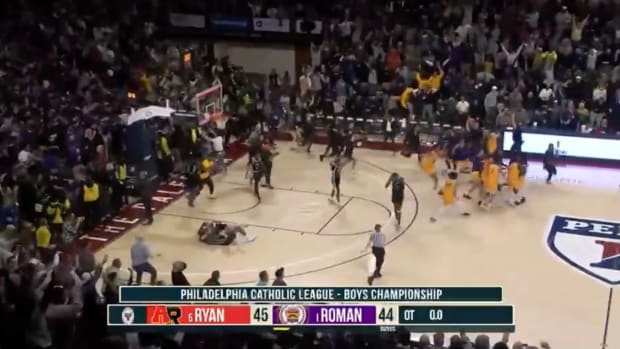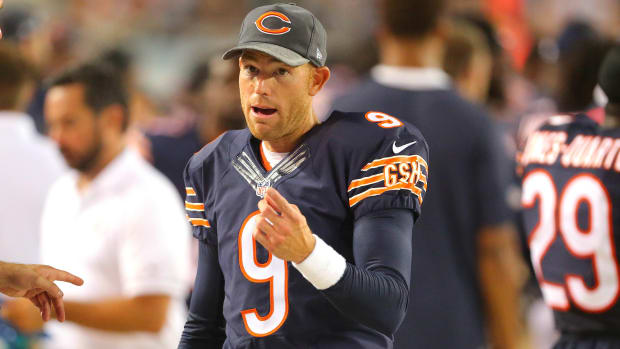SI 60 Q&A: Gary Smith on writing 'Higher Education' -- twice
Higher Education tells the story of Perry Reese Jr., an African-American man who in 1983 became the boys’ varsity basketball coach at the overwhelmingly white Hiland High School, located in an Amish and Mennonite community in Ohio. Reese died in 2000, but not before changing the town and the lives of its citizens. When it ran in the March 5, 2001 issue of Sports Illustrated the story generated an enormous response from readers. It was yet another classic tale by Gary Smith, but its success masked a surprisingly difficult writing process for the man who was nominated for 10 National Magazine Awards. I spoke to Smith recently about the story that ran, the one that didn’t and what he thinks of it today.
SI: This is one of those terrific stories that no one seems to have heard of before seeing it in the magazine. Where did you find it?
SMITH: I was living in Sydney, Australia, in 1999, in advance of the 2000 Summer Olympics, and someone came over – I can’t remember who, probably a family member -- to spend a couple weeks, and they brought USA Today. In a sports wrap-up article it had a couple sentences about an African-American coach in a town that was mostly Mennonite and Amish who led his team to a state title but was gravely ill with brain cancer and wasn’t talking to anyone. It just struck me, and I thought, Wow, there’s gotta be something there. I filed it away that when I got home I was going to check into that story.
As soon as I got home after the Olympics I called the high school and they said he had just died a couple weeks ago. I asked if I could I come out and they said yes. Literally the next morning I was on a plane to Ohio. It all came together really quickly. I started talking to people and they were so moved by this guy and in such mourning and talked about him with such reverence that right away my instincts had been right that there really was something there.
SI: What did you find when you spoke to people in that community?
Ali And His Entourage: Life after the end of the greatest show on earth
SMITH: He really was an outsider who came out of the blue. He was like a mystery to the town when he first showed up. By the end of it, to see the ripple effects this man had caused in so many ways besides basketball was like the funnel opening up, slipping in through the narrow end and widening over time and coming to touch people in so many ways even down to the end of his life.
SI: How did the reporting go?
SMITH: I started at the high school with the guidance counselor, the principal, the secretary, all the people who had dealt with him on a day-to-day basis and just asked them for names of who else this man had touched. This was really a cross generational thing, because parents who never would have dreamed that they’d be entrusting their kids over to this guy they knew that if their kid was going over to Perry’s house good things were happening. The team was bonding and they were learning about life and about Muhammad Ali and Martin Luther King and things they wouldn’t have been exposed to much in that town and to different ways of thinking. His integrity was just that powerful that people came to trust him by letting their armor down bit by bit by bit.
Then there was always the intrigue that hung over the story: What drove this guy to walk into a foreign territory like that and live isolated for a couple years until he found his way in?
SI: And you never had the chance to talk to him of course.
SMITH: Right. Some of that could be resolved but mostly it wasn’t. He remained a mysterious character and his family didn’t even understand why he did it.
You always wish you could talk to the person but once I knew the real story was the effect he had then in some ways, with him being gone, everyone was free to be even more open than I think they would have been had he been alive. There was a trade off involved there, but in this case, story-wise, you gain more power than you would have had. He probably wasn’t the kind of guy who was going to self-reveal either. He kept things pretty tight to the vest. It’s interesting how someone that private can make others more transparent.
• Read every story and Q&A in the SI 60 series
SI: High school kids aren’t usually known as the most emotionally descriptive people. Was it hard getting the material you needed from them?
SMITH: Like you said the 16, 17-year-old male isn’t renowned for handing you the keys to his heart, but that was offset to a pretty large degree by their understanding that something profound had just passed through their lives. They didn’t want to let go, they wanted to keep it alive in a way. They loved the idea that the whole world was going to know this mystery that had fallen into this little town. There was a real desire to share that probably eclipsed the classic teenage male withdrawal and the classic Mennonite and Amish inclination of withdrawing and closing up.
It was more that Perry did something than I did, by far. His spirit was definitely at work in getting them to come forward.
SI: It sometimes seems every town has a great hidden story to tell, often in sports. Why did this one stand out to you?
SI 60 Q&A: Gary Smith on Muhammad Ali, his entourage and memories of the Greatest
SMITH: I thought the stakes were higher, the paradox was deeper, the extremes of culture were greater. You get quieter examples of this kind of stuff happening in towns all over America and sports has the ability to kind of midwife those moments, which is maybe the most wonderful thing of all about sports. This one raised the ante on all of them.
SI: So you knew right away you had a great story.
SMITH: This one sort of came the most obviously. All the bells were ringing, all the stars were aligning. When that doesn’t happen on a story I’m the sort who thinks that maybe I should dig harder and find five more people to talk to about it -- spend another hour with them beyond what they thought they were going to spend. This one, the gates just opened up.
SI: How was the writing of the piece?
SMITH: As easily as the gates opened on this story in everybody’s hearts it actually turned out more difficult to get right in the writing than I would have initially guessed. I wrote the whole thing in the voice of an imaginary villager in the town. I was going to have a character talking about what happened to us, like something had swept through the town and was gone almost like this voice is talking to someone who shows up afterward and he’s going to tell you the tale of what came through his village.
I wrote the whole story that way and it just didn’t quite have the power or the impact that it should have, that it needed to have. That’s when I had that sick moment of, Crap, I gotta start over. And then I realized that maybe by straining the story through three real people I could bring it down to something more manageable. You start with the first person, develop it through the second person and a hit a climax through the third person.
Crime And Punishment: The saga of Richie Parker
Which meant once I picked those three people I had to call them back, bounce a bunch of things off them that I wanted to get in the story but make sure it was true and strain it though those three individuals. So I did. I called them back and had to run it through them to see what their responses were and what they were feeling at that time. That was a good amount more of telephone interviewing. It was a couple weeks writing the first one, three or four days of additional interviewing and probably just short of two weeks to write the second one.
SI: Had you filed the first one or told anyone how you were doing it?
SMITH: I hadn’t send it in, and unless [senior editor] Chris Hunt called -- which he did once in a while, to say, “Where are you at?” – I would just stay in my cocoon.
SI: Was that the normal amount of time it would take you to write a story?
SMITH: It was closer to three weeks usually. I’d just take it as it came. I started from the beginning, I never started elsewhere as I’ve heard other people do. The voice had to develop organically from the beginning. If you hadn’t gotten them all laid down from the beginning and let them grow organically you’d be operating blind if you tried to write sections later. Each day I’d start back and read through what I had and do a lot of editing as I went. By the time I reached the point where I’d left off the previous day, it got the voice back in your head you could see little things you could seed into it. You might drop one more seed in there that you now know is going to be blossoming that you know is set up a little better, or you might pull it back a little more -- maybe you went too far earlier and you need to restrain it. Just making all these balancing decisions as you go.
SI: Other writers have said that writing bonus stories took a year off their life. You wrote virtually nothing but bonuses, so first of all: How’s your health? And second, given that you had to write this story twice, were you ready for it to be over with by then?
SMITH: (Laughs.) I’m fine. I never got sick of it, but when you’re on your second write-through there’s relief when you get to the end and it can kind of be like you’re coming out of a dream. You’ve been so caught up with this swirl.
SI 60 Q&A: Gary Smith on his award-winning morality tale about Richie Parker
I always felt like it was more a learning expedition and I approached them more with the feeling of writing a short story. It was definitely a deep experience each time but it didn’t feel like it was carving years off my life or a pound of flesh.
SI: What was the reaction to the piece?
SMITH: There was a real emotional response. It got more letters than any story I ever wrote for SI. For some reason the number over 600 comes to mind. Some of them may have been emails then, but people were still moved to sit down and write letters.
It’s always gratifying to know that things you were trying to get to and point to found their mark. That’s always a good feedback to a) inspire you to move into the next story and b) to know that things you’re attempting and trying to show without quite saying, that people got it. It helps you to know you’re in the right ballpark.
SI: Do you regret that your original idea didn’t work out?
SMITH: I trusted that even thought the first idea intellectually sounded cooler to me and drew me in -- just picturing this narrator taking you around the town and showing you all these things that happened -- you gotta just go with those ideas and try them. Those things might work better in another piece. But this one was so directly emotional that you ended up feeling it more when you stuck with the real people rather than this creative voice. So no, no regrets at all. There’s always that deep breath of, Oh crap I’ve got to start this over. You feel like you finished the marathon and now you’ve got to find the energy to start another race.
Higher Education: How Perry Reese Jr. changed an Ohio community forever
At some point I stopped going into resistance of those moments. About one-quarter of the stories I wrote during the '90s and early 2000s took real rewrites. You have to just drop the resistance to that and realize that what’s going to make this satisfying is to follow this thread where it takes you.
SI: Do you still have your original version?
SMITH: No, I’m sure I killed it and didn’t keep it around. It was a goner.
SI: What was your reaction to it?
SMITH: It’s probably not the strongest written one I ever did. I don’t think the opening to the story is the greatest or the best executed, but as it rolls along it gathers its force and by the end, when you see these people you never would have dreamed of doing such things – like adopting African-American kids – and this ripple from this very isolated stranger the circle just widening and widening and widening and the crevices that it reaches in human beings – when you see that finally have its full play there’s an emotional poignance that it gathers. In that regard it achieved its purpose.
SI: I’m surprised to hear you were less than thrilled with it, given how popular it was and how good it is.
SMITH: The writing is pretty good, but among the stories I’ve written I never look at this opening and think, Man this thing’s got me by the throat right away. I probably couldn’t put it into words right away. It’s not bad, it’s pretty good, but it’s not the most intriguing pull and invitation into a story executed at the highest level that I’ve done or could be done. Once it gets going, though, it stacks up with anything.




